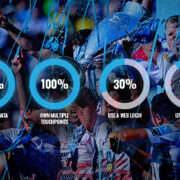The England and Wales Cricket Board (ECB), the organizing body of first-class domestic and national team cricket, is a leading force when it comes to digital transformation – not only in the UK but throughout global cricket. By comparison, our fan-data assessment of the nations which competed at the India 2023 ODI Cricket World Cup highlights the ECB as a benchmark for the sport’s modernization, driven by a diverse digital product portfolio, connected by a single sign-on (SSO).
Furthermore, the ECB is among the most digitally mature and data-rich competition organizers assessed in our upcoming Digital Transformation Regional Market Report | UK, which analyzes the digital and data maturity of 133 clubs competing across nine elite UK-based leagues and the organizers of 18 major sporting events.
The Football Association (The FA), the governing body for English national team football and organizer of the top-flight Women’s Super League (WSL) club competition, is the only one of the 18 major competition organizers assessed to score as highly for its digital transformation efforts as the ECB, whereas other club-based leagues vary in their digital and data maturities.
Premiership Rugby is another organizing body making waves. However, much like first-class cricket, while both Premiership Rugby and the ECB demonstrate strong digital strategies across their domestic competitions, barriers to growth still exist throughout their respective club ecosystems, including a disparity between how elite clubs leverage their digital product portfolios to collect first-party fan data.
Unlike other UK-based governing bodies, the ECB is one of the few which organizes a wide array of domestic men’s and women’s club competitions, including the County Championship, Vitality Blast, and The Hundred. Eighteen county clubs compete in the County Championship, all of which collect fan data in some shape or form.
They also own the highest data maturity – collectively – of the professional competitions outside the Premier League and EFL Championship, English football’s top tier and second division, earmarking UK first-class domestic cricket as a benchmark for growing and retaining digital audiences and a leading example for other sports to follow.
ALL COUNTY CRICKET CLUBS PROVIDE LOYALTY PROGRAMS BUT MAJORITY DON’T CENTRALIZE FAN DATA
Although every first-class county cricket club includes a loyalty program for fans, only a third (33.3 percent) use a web login to centralize data collection across their customer-facing digital products, whereas as few as 11.1 percent utilize a single sign-on (SSO) across all of their data touchpoints. Somerset CCC is not among the clubs to include an SSO but comes top of the County Championship Digital Transformation Table (see the top six below) due to its diverse digital portfolio.
Notably, fewer than half (44.4 percent) of clubs own and operate their own mobile app and/or OTT/streaming offering, while even fewer provide a fantasy/gaming product (16.7 percent) to their fans. In order to expand the league’s digital transformation efforts and align its clubs’ commercial and digital growth strategies, there’s an opportunity for clubs to centralize and build upon their fan-loyalty programs by introducing a mobile-friendly, omnichannel fan experience within a centralized fan ecosystem.
Whereas Middlesex CCC and Somerset CCC are the only two first-class county cricket clubs to set maximum scores for their digital inventories, Lancashire CCC has the highest data maturity of the 18 teams assessed and is only one of two clubs to utilize an SSO – alongside Gloucestershire CCC. Lancashire’s SSO spans the club’s dedicated website, mobile app, ecommerce platform, and ticketing portal, while the organization has options to introduce its own OTT/streaming and fantasy/gaming offerings.
Albeit one of the UK’s digitally mature and data-rich sports, first-class county cricket clubs set an average score of 38.8 percent for their collective data-collection capabilities and has some way to go before they can emulate the ECB, the sport’s national governing body and major events organizer, which sets an almost perfect digital transformation score, as per N3XT Sports’ unique methodology, including 90 percent for fan-data collection.
REGIONAL ANAYLSIS | DOMESTIC CRICKET HOLDS OPPORTUNITY TO CROSS-POLLINATE DIGITAL FAN EXPERIENCES
The UK is one of the world’s leading markets for elite sporting events, including the club-based leagues assessed throughout our upcoming Digital Transformation Regional Market Report | UK. Across many sports, emerging women’s competitions highlight an opportunity for national governing bodies and competition organizers to optimize the fan experience within their multi-club and multi-format sporting ecosystems by consolidating and cross-pollinating their respective digital and data touchpoints across both their men’s and women’s products.
Whereas football’s top-flight Women’s Super League (WSL) and rugby union’s new-look Premiership Women’s Rugby (PWR) competitions are organized in partnership with the sports’ respective national governing bodies – The Football Association (The FA) and the Rugby Football Union (RFU) – and are considered to be separate from the men’s Premier League and Premiership Rugby competitions, the ECB is one of a few club-competition organizers assessed for our UK report to govern all of its respective elite men’s and women’s cricket competitions.
While women’s sport is growing in popularity among the UK fanbase and is primed for its own digital and data evolution, this presents an opportunity for competition organizers to cross-pollinate the men’s and women’s games – while keeping their identities intact – by consolidating fan-data collection at club level. Especially at a time when clubs and leagues are already expanding their digital presence and engaging new fans outside their traditional markets and demographics.
WHAT’S N3XT?
There’s an opportunity, more broadly, for competition rights holders which organize both their men’s and women’s editions to replicate this model within their own digital strategies. By consolidating their digital and data touchpoints across codes, much like English and Welsh domestic cricket, other UK sports properties are also ideally positioned to grow their brands by integrating their multi-stakeholder products into a centralized fan ecosystem.
Albeit no sports organization is entirely alike and there will always be nuances in their business strategies and how they engage with fans, digital transformation acts as a foundation for all sports properties to amplify their commercial efforts by centralizing data and information while simplifying internal workflows. This can be achieved at any level of the sporting pyramid and requires a deep understanding of how their digital ecosystems are connected, how they serve the individual fan, and their capacity for growth.
Our team at N3XT Sports works tirelessly to develop and implement data and digital transformation strategies across a multitude of sports properties at federation level, competition level, and club level. To find out more about how N3XT Sports can serve your organization, fill out the form below, and we’ll be in touch. Our goal is to drive the digitalization of the sports industry and our clients.



